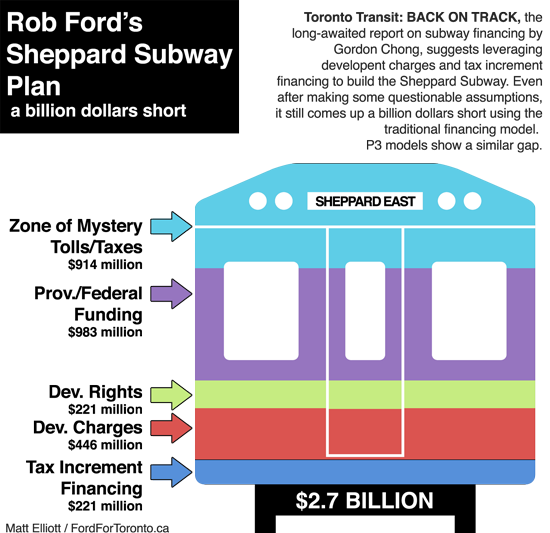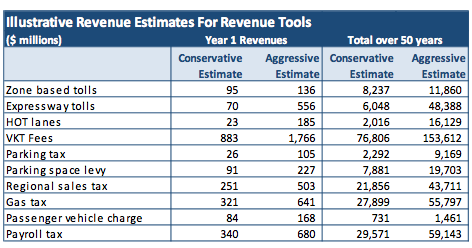After a year of waiting, we finally have our hands on former councillor Gordon Chong’s Sheppard Subway report. This is the document that was supposed to open the door to cheap and extensive subway building. This is the document that was supposed to propel the mayor toward making good on his campaign promise to extend the Sheppard Subway.
That was the theory, anyway. In reality, Chong’s report doesn’t do any of those things. Instead, it suggests that the city make a series of irresponsible financial decisions that will screw with Toronto’s operating budget for decades to come. And it still leaves a billion dollar gap.
To illustrate, here’s how our friends at KPMG — brought in to help with Chong’s financial analysis — suggest we might build an eastward extension of the Sheppard line, from Don Mills to Scarborough Town Centre, at a total cost of $2.7 billion over seven years. This is just one of the scenarios studied. It’s a simple five-step process.
1) Finance $221 million based on an expected rise in property values along Sheppard and Eglinton. They call this Tax Increment Financing. Yes, this means that future property tax revenues generated by Eglinton development will be tied up with construction on Sheppard instead of used to pay for infrastructure and services that might be needed on the Eglinton corridor. But disregard that — we’re building subways here!
2) Finance an additional $446 million based on expected revenue from development charges. And don’t just limit yourself to development charge revenues in the Sheppard & Eglinton corridor — take the cash from developments all across the city. Yeah, this might screw with the city’s credit rating and any increases to non-residential development charges could chase business into the 905, but, again, try to ignore the details. Focus on the subways. They go fast.
We should pause here to note that to drive the revenues we need from the first two steps, we’ll need to drastically increase density along the Eglinton and Sheppard corridors. This means building high-rise condo blocs in the 800-metre zone along both streets. Good thing residents hardly ever oppose tall building projects.
3) Sell 18 city-owned properties along Eglinton & Sheppard for an additional $221 million. We don’t really know which properties, but let’s just assume that we probably don’t need them.
4) Hope against hope that the Eglinton LRT project comes in under budget — which it surely won’t if it’s built underground like the mayor wants — so that the province can transfer $650 million in funding to the Sheppard project. If this doesn’t happen, the whole plan falls to pieces. (The federal government’s $333 million contribution might be contingent on secured provincial funding.)
5) Raise a billion extra dollars somehow. Maybe with tolls and new taxes. Maybe with magic. Who knows? Think of this step like a mystery we’ll all get to solve together. Even if we find a private sector partner willing to pitch in on a P3 for this corridor, KPMG says there will be a similar funding gap — about $730 million — that the city will be on the hook for over the life of the project.
In the end, even granting the sizeable assumptions that there will be provincial funding available for Sheppard and that there’s a politically-viable way to raise a billion dollars that the mayor won’t call a ‘tax grab’, we’ll still face decades of city budgets where some revenue from property tax and development charges won’t be available because they’ll be tied up in bond payments from this subway financing deal. This will handcuff council’s ability to even consider funding any further transit or infrastructure projects until 2050 or so.
All this for eight kilometres of subway.
The Bright Side
But let’s look on the bright side: at the very least, the $150,000 the mayor spent commissioning this report has provided us with a preliminary analysis of potential revenue tools. Rob Ford is never going to consider tolls and taxes — and using them to fund subway construction in the Sheppard corridor is a tough sell — Â but they’re important because inevitably Toronto will have to look to these kinds of revenue-drivers if it wants to continue to grow and improve its infrastructure.
Toronto’s transit expansion can’t stop here. The city needs to push forward with a Downtown Relief Line, an extension of the Eglinton LRT to the airport, a transit connection to Malvern and plans for right-of-way streetcars along the waterfront. Absent committed support for transit from the federal and provincial governments, new tolls and taxes represent the responsible way forward. The alternative is to continue drawing hopeful lines on maps and waiting for other governments to swoop in with funding promises at election time.
Council can throw out most of Chong’s report — it’s irrelevant in the wake of council’s decision last week — but they should give careful consideration to this section. Toronto’s transit future depends on it.
Tags: budget, downtown relief line, eglinton lrt, gordon chong, sheppard suwbay, transit

